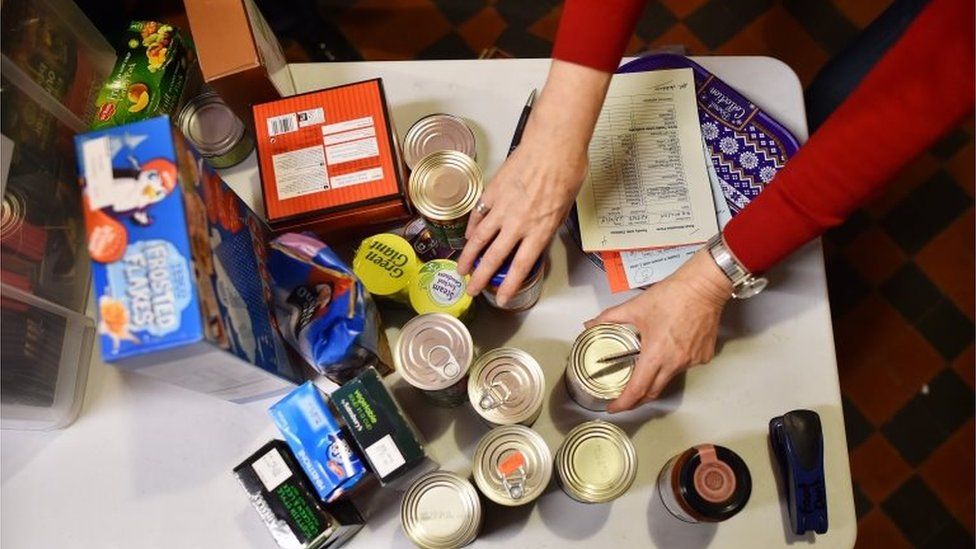Poverty costs UK £78bn a year, Joseph Rowntree Foundation says
- Published
- comments

The effects of poverty in the UK cost the average taxpayer £1,200 a year, and the UK £78bn in total, a report says.
The Joseph Rowntree Foundation looked at how poverty - living on incomes below 60% of the median - affected different government services.
The NHS bore the brunt of the costs, it said, as those in poverty were "more likely" to suffer ill health.
The government said employment was key to beating poverty, adding that "we've made good progress".
The foundation, which funds research into social policy, said its total bill for poverty did not include money spent on benefits.
It said the research, conducted by Heriot-Watt and Loughborough universities, was the first to look at how much poverty across all age groups costs different government departments.
The report outlined the following key costs:
- £29bn on treating health conditions associated with poverty
- £10bn on schools providing initiatives such as free school meals and pupil premium for poorer students
- £9bn on the police and criminal justice systems dealing with the higher incidence of crime in more deprived areas
- £7.5bn on children's services and early years provision, such as free childcare for deprived two-year-olds
- £4.6bn on adult social care
- £4bn on housing
'Most humiliating day of my life'
Mum-of-two Hayley Lewis-Jones, of Minehead, Somerset, works 40 hours a week as a receptionist in a local car garage.
She gets paid £260 a week - half of which goes on rent.
The 49-year-old says the cost of living has risen disproportionately compared to her wage.
In December last year Hayley, who has served in the Women's Royal Army Corps for eight years, had to use a food bank for the first time, and described it as the most humiliating day of her life.
"I just thought 'how did it get to this'," said Hayley, who has raised her two children as single mother for many years.
"Things have got worse, I lived a more comfortable life in the 1980s," she said.
The Trussell Trust, which aims to reduce poverty in the UK, said a record number of people were now using its food banks, with 1.1 million three-day emergency food parcels handed out in 2015-16 - a rise of 2% on the previous year.
'Links to mental illness'
The Joseph Rowntree Foundation report said the strong relationship between poverty and ill health was now "widely accepted" - especially in cases of malnutrition and people living in cold, damp or unsanitary housing.
Ill-health in turn could lead to further difficulty when people were unable to work.
There was also growing evidence of links between poverty and mental illnesses, where the stress of living in poverty triggered "serious episodes" of ill health.
Self-employed carpenter Paul, 47, of Gloucestershire, said he suffered anxiety, depression and panic attacks following the death of his mother.
"I started using the food bank when I was on benefits and struggling to make ends meet sometimes," he said.
Paul started to work as a volunteer at the food bank by repairing furniture for people, and said it gave him the confidence to start working again.
"A food bank can offer so much more than just a can of baked beans," he said.
Julia Unwin, the foundation's chief executive, called for "real action", saying: "Poverty wastes people's potential, depriving our society of the skills and talents of those who have valuable contributions to make. This drags down the productivity of our economy, hinders economic growth, and reduces tax revenue."
A government spokesman said it was "tackling the root causes of poverty" and cited "more people in work than ever before", the National Living Wage and free childcare as areas in which progress had been made.
What is your experience of poverty? What is your reaction to this report? You can email haveyoursay@bbc.co.uk with your experiences.
Please include a contact number if you are willing to speak to a BBC journalist. You can also contact us in the following ways:
- Whatsapp: +44 7525 900971
- Send pictures/video to yourpics@bbc.co.uk
- Upload your pictures/video here
- Tweet: @BBC_HaveYourSay
- Send an SMS or MMS to 61124 or +44 7624 800 100
- Published1 August 2016
- Published26 July 2016
- Published16 May 2016
- Published15 March 2016
- Published1 July 2015